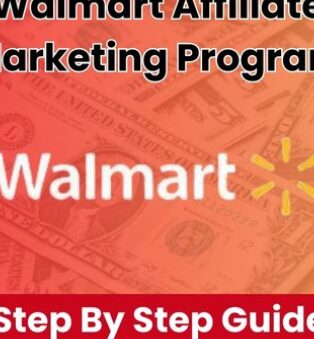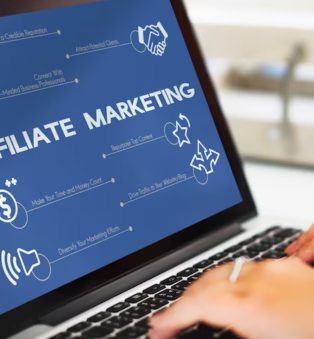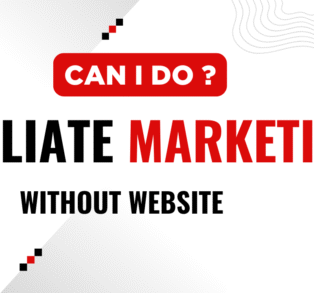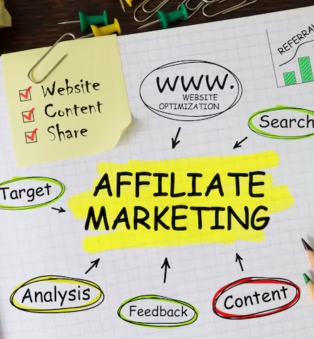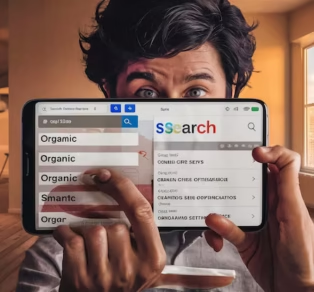Can I Do Affiliate Marketing Without a Website? (A Complete Guide for Beginners)
Affiliate marketing is one of the most popular ways to make money online, but many beginners wonder: “Do I really need a website to get started?”
The short answer is no—you can do affiliate marketing without a website. However, there are pros, cons, and alternative strategies you should know before diving in.
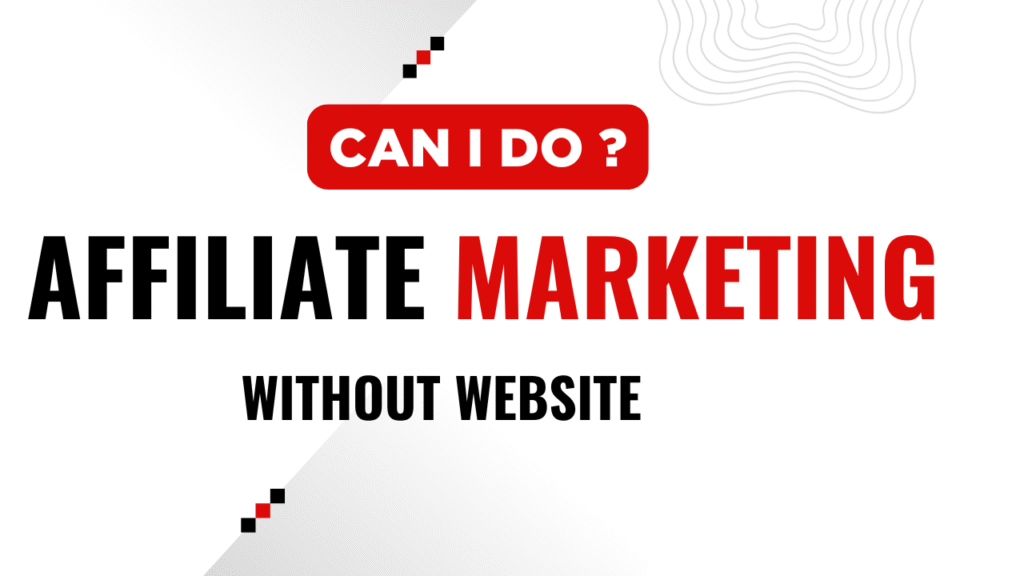
In this 4,000+ word guide, we’ll cover:
✅ How Affiliate Marketing Works Without a Website
✅ 6 Proven Ways to Promote Affiliate Links Without a Site
✅ Pros & Cons of Affiliate Marketing Without a Website
✅ Best Affiliate Programs for Non-Website Owners
✅ How to Track & Maximize Your Earnings
✅ When You Should Consider Building a Website
Let’s get started!
How Does Affiliate Marketing Work Without a Website?
Affiliate marketing is a performance-based model where you earn commissions by promoting other companies’ products. Traditionally, many affiliates use websites (blogs, review sites, etc.) to drive traffic to their affiliate links.
But if you don’t have a website, you can still promote affiliate products through:
Social media (Instagram, TikTok, Facebook, YouTube, Pinterest, etc.)
Email marketing (if you have a subscriber list)
Paid ads (Facebook Ads, Google Ads, native ads)
Forums & Q&A sites (Quora, Reddit, niche forums)
Guest posting (writing for other blogs with your affiliate links)
Free platforms (Medium, LinkedIn, Substack, etc.)
The key is driving traffic to your affiliate links without relying on a personal website.
2. Use Email Marketing (If You Have a List)
If you already have an email list, you can promote affiliate products directly.
How to Start:
Sign up for an email service provider (like Mailchimp or ConvertKit).
Share valuable content and occasionally recommend products.
Always disclose affiliate relationships (required by FTC).
3. Run Paid Ads (Facebook, Google, Native Ads)
If you have a budget, paid ads can scale your affiliate earnings fast.
Best Ad Strategies:
Facebook Ads: Target audiences interested in your niche.
Google Ads: Bid on high-intent keywords (e.g., “best budget laptops”).
Native Ads (Taboola, Outbrain): Promote content on news sites.
💰 Pro Tip: Use a bridge page (a simple landing page) instead of sending traffic directly to the merchant’s site—this improves conversions.
4. Leverage Q&A Sites (Quora, Reddit, Forums)
Answering questions on Quora, Reddit, and niche forums can drive free traffic.
How to Do It:
Find questions related to your affiliate product.
Provide genuine help and naturally mention your affiliate link.
Example:
“I’ve been using XYZ hosting for 2 years—great uptime and support! If you’re interested, here’s a [discount link].”
🚫 Avoid: Blatant self-promotion (can get you banned).
5. Guest Blogging (Write for Other Sites)
Many blogs accept guest posts—you can include affiliate links (with permission).
How to Find Opportunities:
Google “[your niche] + write for us” (e.g., “fitness write for us”).
Pitch high-quality content and follow the site’s guidelines.
6. Free Platforms (Medium, LinkedIn, Substack)
You can publish affiliate content on:
Medium (product reviews, tutorials)
LinkedIn (B2B affiliate offers)
Substack (email-based affiliate marketing)
📌 Example: Write a Medium article like “5 Best Tools for Freelancers in 2024” and embed affiliate links.
Pros & Cons of Affiliate Marketing Without a Website
✅ Pros:
✔ No upfront cost (no domain/hosting fees)
✔ Faster to start (no need to build a site)
✔ Leverages existing audiences (social media, email lists)
❌ Cons:
✖ Less control (platforms can ban your account/links)
✖ Harder to build long-term traffic (no SEO benefits)
✖ Limited tracking (difficult to optimize conversions)
Best Affiliate Programs for Non-Website Owners
Some programs don’t require a website:
Amazon Associates (physical products)
ShareASale (wide variety of niches)
eBay Partner Network (auction-based sales)
CJ Affiliate (big brands like Lowe’s, Priceline)
ClickBank (digital products, high commissions)
When Should You Consider Building a Website?
While you can succeed without a site, having one gives you more control and scalability. Consider building a website if:
🔹 You want long-term passive income (SEO traffic).
🔹 You need better conversion tracking.
🔹 You’re serious about scaling beyond social media bans.
Final Verdict: Can You Do Affiliate Marketing Without a Website?
Yes! You can start affiliate marketing without a website using social media, email, paid ads, and other methods.
However, if you want sustainable, scalable income, a website is the best long-term investment.
🚀 Ready to Start?
Pick an affiliate program (Amazon, ShareASale, etc.).
Choose a promotion method (social media, email, ads).
Drive traffic & track results (use Bitly or Pretty Links).
💡 Need help? Drop a comment below, and I’ll guide you!
Final Verdict: Can You Do Affiliate Marketing Without a Website?
Yes! You can start affiliate marketing without a website using social media, email, paid ads, and other methods.
However, if you want sustainable, scalable income, a website is the best long-term investment.
🚀 Ready to Start?
Pick an affiliate program (Amazon, ShareASale, etc.).
Choose a promotion method (social media, email, ads).
Drive traffic & track results (use Bitly or Pretty Links).
💡 Need help? Drop a comment below, and I’ll guide you!
Affiliate Marketing Without a Website
Can I do affiliate marketing without a website? Yes!
You don't need a website to start affiliate marketing. While having one helps, there are several proven ways to promote affiliate products using social media, email, and other platforms. Here's how it works.
Affiliate Marketing Without Website FAQ
How does affiliate marketing work without a website?
Affiliate marketing without a website involves promoting products through alternative channels:
Primary Methods
- Social media platforms (Instagram, TikTok, YouTube)
- Email marketing to existing subscribers
- Paid advertising (Facebook/Google ads)
- Q&A sites like Quora and Reddit
- Guest posting on other blogs
- Free publishing platforms (Medium, LinkedIn)
The key is driving traffic directly to your affiliate links through these alternative channels.
Can I use social media for affiliate marketing?
Yes, social media is one of the most effective ways to promote affiliate products without a website:
Platform-Specific Strategies
- Instagram: Product showcases in posts/stories
- TikTok/Reels: Short demo videos with links in bio
- YouTube: Product reviews and tutorials
- Pinterest: Create pins linking to products
- Facebook: Share in relevant groups (where allowed)
Always disclose affiliate relationships and focus on providing value first.
How can email marketing work for affiliates?
If you have an email list, you can promote affiliate products effectively:
Email Strategy
- Share valuable content with occasional product recommendations
- Create dedicated "best of" or "roundup" emails
- Segment your list for targeted promotions
- Always include proper disclosures (FTC requirement)
Start building your list early, even if you don't have a website, using services like Mailchimp or ConvertKit.
Can I run paid ads without a website?
Yes, but with some important considerations:
Paid Ad Strategies
- Facebook/Instagram ads driving to your affiliate link
- Google Ads targeting high-intent search queries
- Native ads (Taboola/Outbrain) promoting your content
- Consider using a simple landing page as a "bridge"
Check affiliate program policies as some prohibit direct linking from paid ads.
How do I use Q&A sites for affiliate marketing?
Platforms like Quora and Reddit can drive targeted traffic:
Best Practices
- Find questions related to your affiliate products
- Provide genuine, helpful answers first
- Naturally mention your experience with the product
- Include your affiliate link as a resource
- Follow all platform rules about self-promotion
Example: "After trying several options, I found [Product] works best. Here's where you can check it out [affiliate link]."
What are the pros and cons of no-website affiliate marketing?
Advantages
- No upfront costs for domain/hosting
- Faster to get started
- Leverage existing social audiences
- No technical skills required
- Test different niches easily
Disadvantages
- Platforms can change rules or ban accounts
- Harder to build long-term traffic
- Limited conversion tracking
- Less control over user experience
- May face more competition
Which affiliate programs work best without a website?
These programs are beginner-friendly for non-website owners:
Top Programs
- Amazon Associates: Physical products across all categories
- ShareASale: Wide variety of merchants
- eBay Partner Network: Auction-style promotions
- CJ Affiliate: Major brands across industries
- ClickBank: Digital products with high commissions
Always check individual program requirements as some may still ask for a website.
How do I track my affiliate links without a website?
Use these tools to monitor your affiliate performance:
Tracking Solutions
- Bitly: Shorten and track link clicks
- Pretty Links: Create clean, branded links
- UTM Parameters: Add tracking to URLs
- Affiliate Dashboard: Most programs provide stats
- Google Analytics: If using landing pages
Tracking helps you identify which methods are working best.
When should I consider building a website?
Consider creating a website when:
Signs You're Ready
- You're serious about long-term affiliate marketing
- You want to build SEO traffic that grows over time
- You need better conversion tracking and optimization
- You're tired of platform rules changing
- You want to build an email list more effectively
A website gives you full control and asset ownership.
What's the best way to start without a website?
Simple 3-step process to begin:
Getting Started
- Choose an affiliate program (Amazon is beginner-friendly)
- Pick one promotion method (start with social media)
- Create content and share your affiliate links
Focus on one method first, master it, then expand to others.
Ready to Start Affiliate Marketing?
Join our training program to learn how to earn commissions without a website
Get Started Today
